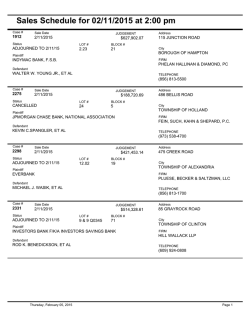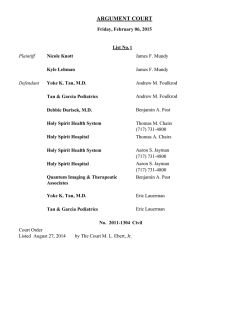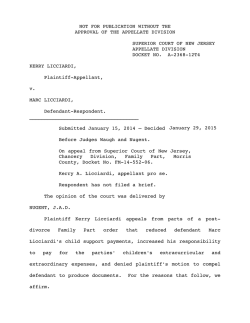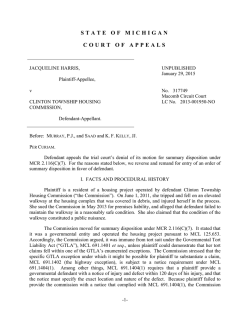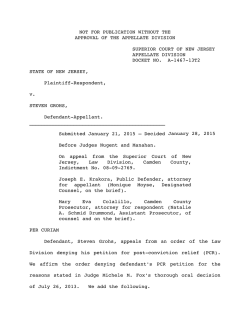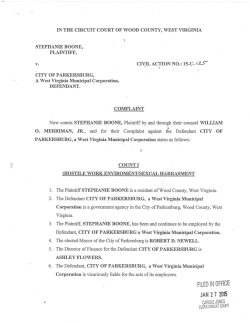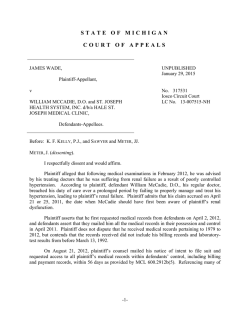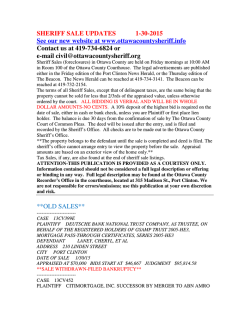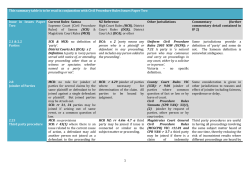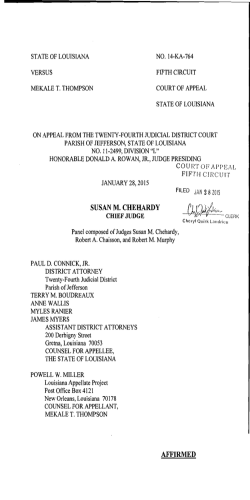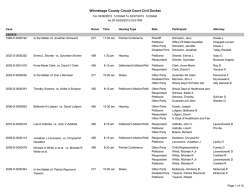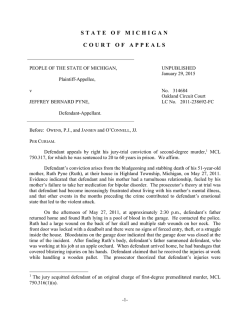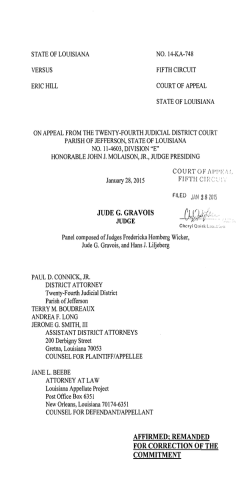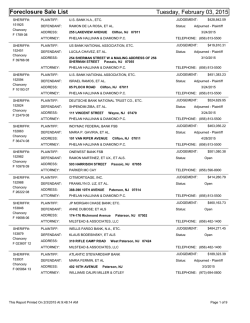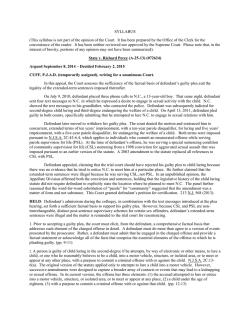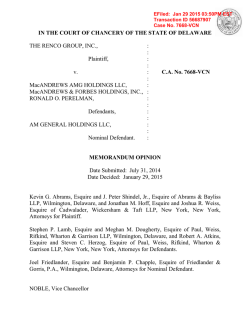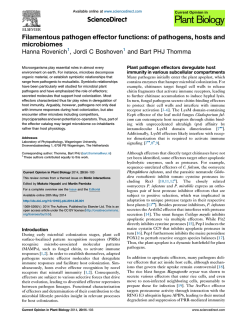
Unpublished 01/29/2015
STATE OF MICHIGAN COURT OF APPEALS WEST MICHIGAN FILM LLC, UNPUBLISHED January 29, 2015 Plaintiff-Appellant, v JAMES W. METZ II, and DONOVAN MOTLEY No. 319119 Ingham Circuit Court LC No. 13-000649-NZ Defendants-Appellees. Before: TALBOT, C.J., and CAVANAGH and M. J. KELLY, JJ. PER CURIAM. Plaintiff, West Michigan Film LLC, appeals as of right an order granting defendants’ motions for summary disposition, dismissing claims of tortious interference with a business relationship or expectancy on grounds of governmental immunity. We vacate and remand for further proceedings. In 2006, real estate developer John C. Buchanan, Jr. and his father co-owned Alpinist Endeavors, LLC. Alpinist Endeavors owned a building that had been converted from a facility where aircraft was built, to a condominium-type development for industrial and/or office use. After several units remained unoccupied, Buchanan sought an investor interested in buying units and using them as a film studio. Pursuant to MCL 208.1457, such investment might qualify for an infrastructure tax credit. Joseph Peters, a real estate developer, was interested in making a deal with Alpinist Endeavors and formed West Michigan Film LLC, the plaintiff in this matter. Plaintiff would buy two units from Alpinist Endeavors for $40 million and then seek a $10 million tax credit as permitted under the statute. At some point, public accusations were made that this project was a sham designed to dupe the State into issuing a $10 million tax credit, which prompted a criminal investigation of the “Hangar 42” project. Defendants, Assistant Attorney General James Metz and Investigator Donovan Motley, were assigned to the investigation, which culminated in criminal charges being filed against Buchanan and Peters, the principals, for attempted fraud. Although the charges were eventually dismissed for lack of probable cause, plaintiff was never able to obtain the tax credit. Subsequently, plaintiff filed this lawsuit against defendants Metz and Motley, bringing one count of tortious interference with a business relationship or expectancy. Plaintiff alleged in its complaint that defendants “conducted a baseless investigation designed to come to a preordained false conclusion that a crime had been committed, and publicly and falsely accused -1- the principal businessmen involved in the deal with crimes against the State.” Plaintiff set forth defendants’ wrongful acts as including: a. Conducting a criminal investigation that deliberately ignored exculpatory facts to reach a preordained conclusion not supported by probable cause; b. Making false and misleading statements to magistrates to induce the magistrates to issue arrest warrants; c. Arresting the principal members of West Michigan Film without probable cause; d. Providing false and misleading information to the Attorney General that formed the basis of repeated announcements to the press that the deal was fraudulent and that the principal parties were guilty of crimes; e. Telling potential witnesses as the investigation ensued that it was already known that Mr. Peters and Mr. Buchanan were crooks and defendants just needed to talk to the witnesses to confirm what were established facts; f. Misrepresenting to the court that issued the arrest warrant for Buchanan that Buchanan had solicited a false appraisal from his appraiser in order to overstate the value of the project. Plaintiff further alleged that defendants’ actions “caused a breach or termination of [plaintiff’s] business expectancy with the State, as no re-application for the tax credit certificate would be considered during the investigation and prosecution, and the opportunity to complete the deal expired before the prosecution ended.” Plaintiff also claimed that neither defendant was entitled to governmental immunity under MCL 691.1407. Defendant Motley responded to plaintiff’s complaint with a motion for summary disposition pursuant to MCR 2.116(C)(7) and (C)(8). Defendant Motley acknowledged that he was a special agent for the Michigan Department of Attorney General and was involved in the investigation of this matter. But, defendant Motley argued, pursuant to Maiden v Rozwood, 461 Mich 109, 134; 597 NW2d 817 (1999), he was entitled to absolute witness immunity regarding plaintiff’s allegation that he made false statements to the court in judicial proceedings. Further, he was entitled to qualified governmental immunity regarding plaintiff’s allegations arising from his investigation of this matter as set forth in Ross v Consumers Power Co (On Rehearing), 420 Mich 567, 633-634; 363 NW2d 641 (1984). See Odom v Wayne Co, 482 Mich 459, 461; 760 NW2d 217 (2008). And, because the alleged acts were discretionary, were undertaken in good faith (as he attested in his attached affidavit), during the course of his employment, and within the scope of his authority, such acts could not give rise to plaintiff’s intentional tort action. See id. at 480. Moreover, defendant Motley argued, plaintiff did not have an adequate business expectancy to support its claim because the Film Office, which issued the tax credit, was vested with broad discretion. Accordingly, defendant Motley argued, plaintiff’s intentional tort claim against him should be summarily dismissed. -2- Defendant Metz also responded to plaintiff’s complaint with a motion for summary disposition pursuant to MCR 2.116(C)(7) and (C)(8). Defendant Metz acknowledged that he was the Assistant Attorney General who prosecuted the underlying matter. But, he argued, because the allegations against him were premised on his decision to prosecute the principals, he was entitled to absolute prosecutorial immunity as set forth in Bischoff v Calhoun Co Prosecutor, 173 Mich App 802, 808; 434 NW2d 249 (1988), citing Imbler v Pachtman, 424 US 409, 431; 96 S Ct 984; 47 L Ed 2d 128 (1976). Moreover, defendant Metz argued, plaintiff did not have an adequate business expectancy to support its claim because the Film Office, which issued the tax credit, was vested with broad discretion. Accordingly, defendant Metz argued, plaintiff’s intentional tort claim against him should be summarily dismissed. Plaintiff responded to defendant Motley’s motion for summary disposition, arguing that it had a valid business relationship or expectancy with the State and defendant interfered with it through various intentional actions which induced the State to terminate their relationship or plaintiff’s expectancy, i.e., defendant’s intentional actions induced the State to refuse to issue the agreed upon tax credit. In particular, plaintiff argued, defendant Motley committed the following intentional acts of interference: (1) conducted an investigation that deliberately ignored facts which negated probable cause, violating the Fourth Amendment, (2) fabricated evidence of probable cause to secure arrest warrants and then made arrests without probable cause, and (3) provided false information used in press releases and told people that the principals were crooks, constituting the negligent tort of defamation. These acts were wrongful per se or, in the alternative, were committed with malice; thus, defendant Motley was not entitled to governmental immunity. See Bonelli v Volkswagen of America, Inc, 166 Mich App 483, 498499; 421 NW2d 213 (1988). Accordingly, plaintiff argued, defendant Motley was not entitled to summary disposition. Plaintiff also filed a response in opposition to defendant Metz’s motion for summary disposition, arguing that it had a valid business relationship or expectancy with the State and defendant interfered with it through various intentional actions which induced the State to terminate their relationship or plaintiff’s expectancy, i.e., defendant’s intentional actions induced the State to refuse to issue the agreed upon tax credit. In general, plaintiff argued that defendant committed the following intentional acts of interference before the prosecution: (1) controlled and participated in the preliminary investigation that deliberately ignored facts which negated probable cause,1 (2) personally obtained information from witnesses that the appraisal of the subject property was legitimate, contrary to sworn statements made by defendant Motley, (3) personally spoke with Buchanan’s father who advised that Buchanan had permission to sell the units to plaintiff, contrary to sworn statements made by defendant Motley, (4) falsely advised defendant Motley that probable cause to arrest existed,2 and (5) provided false and defamatory 1 See Prince v Hicks, 198 F3d 607, 612 (CA 6, 1999). 2 See Harris v Bornhorst, 513 F3d 503, 509-510 (CA 6, 2008). -3- information used in press releases.3 Accordingly, plaintiff argued, defendant Metz was not entitled to summary disposition. Following oral arguments, the trial court granted defendants’ motions for summary disposition. The court held that defendant Metz was entitled to absolute prosecutorial immunity under MCR 2.116(C)(7) because he was operating in his role as a prosecutor with regard to the underlying investigation that gave rise to this civil case. “[T]he prosecutor has to investigate every charge before they make a filing of some type.” Further, defendant Motley was entitled to absolute witness immunity because plaintiff’s primary claim was that his testimony before the magistrate in support of arrest warrants was false. The trial court also noted: “unless there is some tie that somehow there’s a conspiracy that the Attorney General was just doing this so that the Film Board would turn the application down, I don’t see how these individuals would be interfering with any economic benefit of [plaintiff].” Thereafter, an order granting both defendants’ motions pursuant to MCR 2.116(C)(7) and (C)(8) was entered and this appeal followed. First, plaintiff argues that defendant Metz was not entitled to absolute prosecutorial immunity for his various intentional actions which interfered with plaintiff’s valid business relationship or expectancy with the State; thus, the trial court erred when it granted his motion for summary disposition under MCR 2.116(C)(7). We agree, in part. This Court reviews de novo a trial court’s decision on a motion for summary disposition. Odom, 482 Mich at 466. Summary disposition may be granted under MCR 2.116(C)(7) when a claim is barred because of immunity granted by law. In deciding such a motion, the court must consider the pleadings and any affidavits, depositions, or other documentary evidence submitted by the parties. MCR 2.116(G)(5); Holmes v Mich Capital Med Ctr, 242 Mich App 703, 706; 620 NW2d 319 (2000). The parties agree that Michigan standards for prosecutorial immunity are the same as federal standards: prosecutors are considered “quasi-judicial officers” and are entitled to absolute immunity from civil liability for conduct committed within the scope of prosecutorial duties or functions. See Bischoff, 173 Mich App at 807-808, citing Imbler, 424 US at 431. Absolute immunity applies when the alleged activities “were intimately associated with the judicial phase of the criminal process.” Id. at 430. But, as the United States Supreme Court explained in Buckley, 509 US 259: A prosecutor’s administrative duties and those investigatory functions that do not relate to an advocate’s preparation for the initiation of a prosecution or for judicial proceedings are not entitled to absolute immunity. We have not retreated, however, from the principle that acts undertaken by a prosecutor in preparing for the initiation of judicial proceedings or for trial, and which occur in the course of his role as an advocate for the State, are entitled to the protections of absolute immunity. Those acts must include the professional evaluation of the evidence 3 See Buckley v Fitzsimmons, 509 US 259, 278; 113 S Ct 2606; 125 L Ed 2d 209 (1993). -4- assembled by the police and appropriate preparation for its presentation at trial or before a grand jury after a decision to seek an indictment has been made. * * * There is a difference between the advocate’s role in evaluating evidence and interviewing witnesses as he prepares for trial, on the one hand, and the detective’s role in searching for the clues and corroboration that might give him probable cause to recommend that a suspect be arrested, on the other hand. When a prosecutor performs the investigative functions normally performed by a detective or police officer, it is “neither appropriate nor justifiable that, for the same act, immunity should protect the one and not the other.” Thus, if a prosecutor plans and executes a raid on a suspected weapons cache, he “has no greater claim to complete immunity than activities of police officers allegedly acting under his direction.” [Id. at 273-274 (internal citations omitted).] Here, plaintiff alleged that defendant Metz interfered with its business relationship or expectancy by intentionally engaging in wrongful acts, or by doing lawful acts with malice, for the purpose of interfering with plaintiff’s relationship with the State. See Bonelli, 166 Mich App at 498-499. Plaintiff’s specific allegations are set forth above and involve intentional acts of interference by defendant Metz during his preliminary investigation, before charges were filed against the principals. That is, defendant Metz was extensively involved in gathering evidence. He determined which witnesses to interview, questioned witnesses personally, and observed the questioning of other witnesses. He also acquired and reviewed documentary evidence. And, plaintiff alleged, despite all of the exculpatory information that he acquired during his investigation, defendant Metz falsely advised defendant Motley that probable cause to arrest existed, and informed the media of numerous falsehoods. As the United States District Court for the Eastern District of Michigan recently held in the federal case arising from this matter, defendant Metz was not entitled to absolute prosecutorial immunity for his participation in the investigation that was conducted prior to criminal proceedings being commenced against the principals of the business transaction at issue here.4 Buchanan v Metz, 6 F Supp 3d 730, 743 (ED Mich, 2014). Under the specific circumstances presented in this case, where he was performing an investigative function much like a detective who gathers and evaluates evidence, defendant Metz was not entitled to absolute immunity. Id.5 And defendant Metz was not entitled to absolute immunity for advising defendant Motley that probable cause to arrest existed. Id. at 743-744.6 However, defendant 4 Defendants submitted the federal court’s opinion as supplemental authority to this Court and stated that: “[t]he occurrences giving rise to the federal case, and the allegations made by the plaintiff against Metz in the federal case are identical to the occurrences and allegations involved in the present case before this Court.” 5 Citing Buckley, 509 US at 275-276 and Prince, 198 F3d at 612-613. 6 Citing Prince, 198 F3d at 613-615. -5- Metz was entitled to absolute immunity with regard to his decisions to arrest and prosecute the principals, including his participation in securing arrest warrants, as these actions were not investigatory actions—they were prosecutorial in nature. Id. at 744.7 Accordingly, the trial court’s decision to dismiss plaintiff’s intentional tort claim against defendant Metz pursuant to MCR 2.116(C)(7), on the ground that he was entitled to absolute prosecutorial immunity, was erroneous. Second, plaintiff argues that defendant Motley was not entitled to absolute witness immunity for his various intentional actions which interfered with plaintiff’s valid business relationship or expectancy with the State; thus, the trial court erred when it granted his motion for summary disposition under MCR 2.116(C)(7). We agree. In dismissing plaintiff’s claim against defendant Motley, the trial court only considered plaintiff’s allegation that he provided false testimony to magistrates to induce the issuance of arrest warrants. And on appeal plaintiff does not challenge the court’s conclusion that defendant Motley was entitled to absolute witness immunity with regard to this testimony; therefore, we need not consider this decision. But, plaintiff argues on appeal, the trial court dismissed its claim without considering the other “per se wrongful acts” or lawful acts committed with malice that defendant Motley intentionally did for the purpose of interfering with plaintiff’s relationship with the State. We agree. For example, the trial court never considered plaintiff’s allegations that defendant Motley: (1) participated in the criminal investigation of the principals that was purposefully designed to ignore exculpatory evidence that negated probable cause, (2) arrested the principals without probable cause, (3) maliciously prosecuted the principals, and (4) made public and false criminal accusations against the principals that were published through press releases. Therefore, the trial court’s decision to dismiss plaintiff’s intentional tort claim against defendant Motley pursuant to MCR 2.116(C)(7), on ground that he was entitled to absolute witness immunity, was erroneous. We note that the trial court’s order indicated that plaintiff’s claims were also dismissed pursuant to MCR 2.116(C)(8), failure to state a claim, and the court’s legal rationale was limited to: “unless there is some tie that somehow there’s a conspiracy that the Attorney General was just doing this so that the Film Board would turn the application down, I don’t see how these individuals would be interfering with any economic benefit of [plaintiff].” However, both parties agree that the elements of tortious interference with a business relationship or expectancy are: “the existence of a valid business relationship or expectancy, knowledge of the relationship or expectancy on the part of the defendant, an intentional interference by the defendant inducing or causing a breach or termination of the relationship or expectancy, and resultant damage to the plaintiff.” Dalley v Dykema Gossett PLLC, 287 Mich App 296, 323; 788 NW2d 679 (2010), quoting BPS Clinical Laboratories v Blue Cross & Blue Shield of Mich (On Remand), 217 Mich App 687, 698-699; 552 NW2d 919 (1996). Therefore, plaintiff’s failure to plead that a “conspiracy” existed was not fatal to its claims against defendants and the trial court’s decision in this regard is also vacated. 7 Citing Burns v Reed, 500 US 478, 484; 111 S Ct 1934; 114 L Ed 2d 547 (1991). -6- Accordingly, we vacate the trial court’s order dismissing plaintiff’s claims of tortious interference with a business relationship or expectancy pursuant to MCR 2.116(C)(7) and (C)(8), and remand this matter for further proceedings consistent with this opinion. Vacated and remanded. We do not retain jurisdiction. /s/ Michael J. Talbot /s/ Mark J. Cavanagh /s/ Michael J. Kelly -7-
© Copyright 2026
